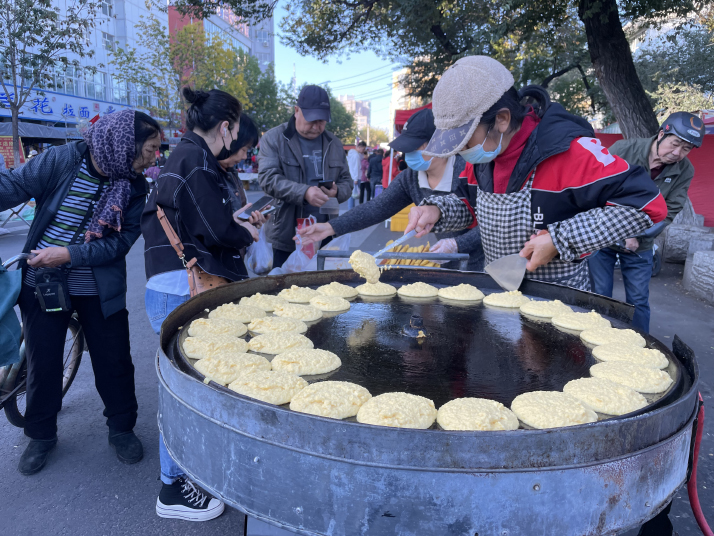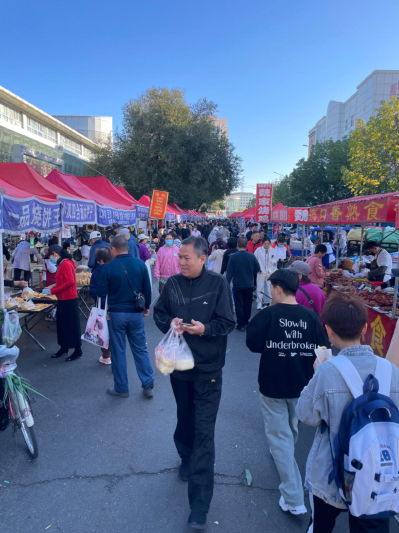| China |
| Exploring the vibrant morning markets in northeast China | |
|
|
 A vendor fries layered flatbreads in a morning market in Qiqihar, Heilongjiang Province, on September 26 (WANG YAJUAN)
In the darkness before dawn, vendors arrive in dribs and drabs at Xiaoheyan morning market in Shenyang, Liaoning Province in northeast China. Wrapped in thick clothes, the vendors set up stalls and turn on stoves. Tantalizing aromas from boiling pots and sizzling pans gradually waft through the air. A trickle of customers arrives for a bite of hot food as the sun just begins to rise. Long lines start to form in front of popular vendors. The market is a new destination for tourists in the city, and it is common to see some people dragging luggage while shuttling back and forth along rows of stalls, holding bags of freshly made food. Morning markets in Liaoning, Jilin and Heilongjiang, the three provinces in northeast China, have become attention grabbers on social media in recent months. Videos highlighting the low prices of local food, including morning snacks, fruit and vegetables, at these morning markets have gone viral online. One deep fried pastry filled with red bean paste, for example, costs at least 4 yuan ($0.56) in Beijing but is only 1 yuan ($0.14) in these markets. Social media posts with titles such as "Getting stuffed for less than 10 yuan ($1.4) in northeast China" have vividly captured the glamor of these markets—cheap and cheerful food.  Customers shuttle along rows of stalls at a bustling morning market in Qiqihar, Heilongjiang Province, on September 26 (WANG YAJUAN)
The boom The popularity of Xiaoheyan morning market on social media is a surprise for Dong Lijuan, who runs a stall there serving wontons. She was granted a permit to run a stall in the market six months ago. At that time, the market was more for residents living nearby, especially seniors who like to get up early and buy cheaper produce. Half a year ago, China was in the middle of a craze for Zibo barbeque. The distinctive barbecue culture in Zibo, a small city in Shandong Province, inspired a barbecue fever all over the country and attracted swarms of tourists. Some cities in northeast China, claiming to have their own unique barbecue culture and loyal barbecue followers, began looking for ways to compete with Zibo. In the end, it has been morning snacks, rather than barbecue that have made these cities hot tourist destinations. Dong noticed the number of tourists in the market increased around the National Day holiday, which fell on September 30 to October 7 this year. "Since then, we have seen a growing number of people holding smartphones, livestreaming the process of shopping in the market," Dong told Beijing Review. Dong and her husband normally get up around 3 a.m. on weekdays to begin preparing wontons. On weekends, they need to get up before 2 a.m. "We never count how many wontons we sell in one morning, but it seems no matter how many we make, we always sell out," she said. To keep up with this hectic schedule, their bedtime is around 7 p.m. This is the daily routine for most vendors at morning markets. A vendor surnamed Han, selling steamed stuffed buns, or baozi, at the market also gets up with his wife around 2 a.m. on weekends. His baozi are not cheap among the bundles of low-price snacks. With only vegetable fillings, one bun costs 3 yuan ($0.4). "This might be the highest price for vegetable baozi in Shenyang," Han told Beijing Review. "But our baozi sell well and many customers come back." A veteran vendor at the market for eight years, Han said now is the prime time of the market. "We saw a sharp decrease in customers in recent years due to COVID-19," he said. "Now we see more people here, even more than that before the pandemic." It is easy to spot Han in the market because of his unique way of loudly and rhythmically shouting out his food items. In a video uploaded on Douyin, China's leading short video platform, Han stands behind the steam rising from his baozi on a snowy morning in the market, yelling: "Be it rain or snow, I am waiting for you at Xiaoheyan!" Liu Xin, a Beijinger who visited Shenyang twice in November alone said the hustle and bustle is a main attraction of the morning markets in northeast China. A bit over three hours by high-speed train from Beijing, Shenyang has become a new beloved weekend destination for Beijingers. "It is quite relaxing to be immersed in the hubbub of the market, particularly the hawking of vendors," Liu said. "It is a city of hospitality." Heat in winter The popularity of morning markets has swept through quite a few cities, including Changchun, capital of Jilin, and Harbin, capital of Heilongjiang. Northeast China's winter wonderland is now providing something new for tourists besides snow and ice scenery. This boom in morning market tourism, though, seems to only have occurred in cities already popular with tourists. A stallholder surnamed Zhang in a morning market in Mudanjiang, Heilongjiang, said she hadn't experienced an uptick in business from tourists as not many tourists visit the city. She and her husband sell a morning snack local to northeast China that could be described as an "egg burger," with one layer of fried egg and another layer of meat between layers of batter. Zhang is a real veteran in this business, having been a stallholder in a morning market in the city for 22 years, and hers are rated as the best egg burgers in the city. In summer, the couple arrives at the market at 2 a.m. to cater to customers, mostly workers at the local train station and young people on nights out. Winter is a slack season for the business as few customers get up so early to brave the super coldness of northeast China's winter. In winter, Zhang usually sets her stall up at around 5 a.m. "We've only seen a decrease of customers in the last few days as it is getting colder and colder now." There are some teething problems as these morning markets become more popular with tourists. A vlogger with over 4 million followers was shamed by viewers for exaggerating low prices in the morning markets in order to attract views. The vlogger claimed that 100 yuan ($14) is enough to make 30 people full, but later apologized for the exaggeration. There have also been some complaints and concerns from local people that the swarming tourists could drive prices up. In response, local authorities in some cities such as Shenyang have introduced measures to regulate pricing. "We should maintain a rational view of the popularity of morning markets in northeast China," Lu Yi, a professor of journalism at Peking University, told Beijing Review. "It could cool down one day like the barbecue heat in Zibo. But this kind of popularity with foodies helps to attract more people to visit and explore tourism destinations, from a perspective that is different from that of regular travelers." (Print Edition Title: Snacking at Sunrise) Copyedited by G.P. Wilson Comments to yuanyuan@cicgamericas.com |
|
||||||||||||||||||||||||||||
|
